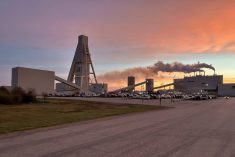WINNIPEG — It appears a summer heat wave could be headed for the Canadian Prairies.
Daniel Bezte, a climatologist based near Winnipeg, sees indications of an onset of warm, dry air next week.
“I don’t think anybody would frown on a couple weeks of (that).”
For over a month now, Bezte says the Prairies have been repeating the same basic pattern. A big tropical pressure system over eastern North America spawns the development of a ridge on the western part. Each time the ridge drifts over to the Prairies, an upper low comes along and flattens out the warm air.
Read Also

B.C. ostriches culled, CFIA confirms
Ostriches on an embattled Edgewood, B.C. farm have been culled after a prolonged legal battle, the Canadian Food Inspection Agency has confirmed.
“We’re seeing that right now,” said Bezte, noting there’s another upper low due to come through this weekend, bringing with it unsettled weather.
Next week, though, his models indicate that a strong ridge of high pressure will develop in the west and then build up over central North America.
“If that actually plays out it means we’ll see fairly dry weather across the Prairies,” he says, with the exception of the odd thunderstorm.
With highs expected to push 30 C on most days next week, Bezte says it kind of looks like a heat wave might be developing. For flood-stricken producers in southeastern Saskatchewan and southwestern Manitoba, Bezte says the weather will likely come as a relief. He adds it’s a trend the Prairies hasn’t felt yet this year.
“Not really. We’ve had a couple of days where it gets really warm but then another low seems to crash through and bring us back to cooler than average weather.”
Bezte also has his eye on the Pacific Ocean right now. He says it has been “on the edge” of slipping into an El Nino situation. If that occurs, he says it will likely make next winter a milder affair than the recent one.














